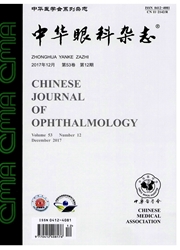

 中文摘要:
中文摘要:
目的 评估渗出性AMD患者的视觉相关生活质量.方法 回顾性系列病例研究.采用美国国立眼科研究院视功能问卷(NEI-VFQ-25)中文版对2007年7月至2008年7月就诊于北京同仁眼科中心的122例渗出性AMD患者的视觉相关生活质量进行评定.对符合正态分布的数据运用t检验,非正态分布的数据运用Wilcoxon秩和检验.结果 122份问卷中共87份完整问卷纳入最终分析.不包括驾驶亚项,NEI-VFQ-25问卷显示总分为(57.2±18.4)分,问卷中得分最低的是近距离活动亚项,评分平均水平为(30.8±22.3)分.患者心理健康亚项分值在男性[(52.9±26.3)分]和女性[(40.8±26.0)分]之间的差异有统计学意义(w=1 175,P<0.05).除一般健康及眼痛亚项之外,双眼受累患者在其他亚项上的分值及总分均低于单眼受累患者,差异有统计学意义(P<0.05).双眼患病患者中不同年龄分组(< 65岁组和≥65岁组)仅在社会活动[(56.6±22.2)分和(42.3±30.2)分]亚项的评分中差异有统计学意义(w=97,P=0.013).结论 渗出性AMD严重影响患者的近距离活动.女性心理健康分值低于男性.双眼受累患者的视觉相关生活质量低于单眼受累患者.年龄仅对双眼患者的社会活动有明显影响.
 英文摘要:
英文摘要:
Objective To evaluate the vision-related quality of life in patients with exudative agerelated macular degeneration (AMD).Methods Retrospective case-series study.One hundred and twentytwo patients with exudative AMD who were treated in Beijing Tongren Eye Center from July 2007 to July 2008 were invited to participate in this study.Vision-related quality of life was evaluated by the 25-item National Eye Institute Visual Functioning Questionnaire.Statistical analysis was performed using t test for data which were normal distribution and using Wilcoxon rank sum test for data which were abnormal distribution.Results Eighty-seven cases were fully completed and included in the final analysis within the 122 questionnaires.The total score of the questionnaire was 57.2 ± 18.4,excluded driving item.The lowest scoring item was near activities with mean score of 30.8 ± 22.3.There was statistically significant difference in mental health between male (52.9 ± 26.3) and female (40.8 ± 26.0) (w =1 175,P 〈 0.05).Except for the general health and ocular pain,patients with binocular involvement showed statistically significant lower scores than those with monocular involvement in all other subscales (P 〈 0.05).The two age groups (patients 〈 65 vs.≥65 years old) in binocular involvement group showed statistically significant difference only in the subscale of social activities (56.6±22.2 vs.42.3 ±30.2) (w=97,P=0.013).Conclusions This study suggests that exudative AMD damaged patients' near activities seriously.Female patients tends to have lower scores than male in mental health.The score of patients with binocular involvement is lower than that of patients with monocular involvement.Age has significant effects on the social activities of those patients with binocular involvement.
 同期刊论文项目
同期刊论文项目
 同项目期刊论文
同项目期刊论文
 期刊信息
期刊信息
